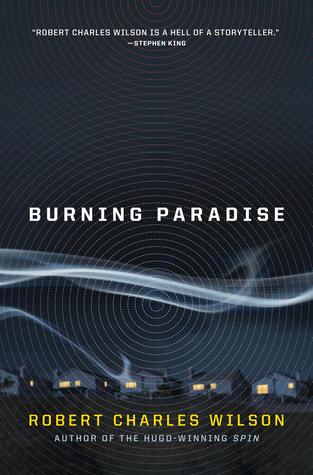As similar as the reality in Robert Charles Wilson’s new novel Burning Paradise may seem to ours, it’s actually very different. The world is preparing to celebrate a Century of Peace since the 1914 Armistice that ended the Great War. There was no Great Depression or World War II, and segregation in the US was abolished in the 1930s. The world has become a little safer and wealthier every day.
Most of humanity is unaware that the seemingly benign changes that led to all of this are actually the result of interference by an extraterrestrial intelligence that resides in the Earth’s radiosphere. A small group of scientists—the Correspondence Society—discovered the truth a few years before the start of the novel. As a result, many of them were massacred… and now the alien agents known as “simulacra” are coming for the relatives of those who were murdered.
Burning Paradise initially follows two main characters in alternating chapters. Cassie is the daughter of one of the murdered Correspondence Society scientists. She and her little brother Thomas now live together with her aunt Nerissa, the ex-wife of another Society member. When a simulacrum finds Cassie after years of relative peace, she follows the protocol that was established after the last purge of Correspondence Society members: get out, warn another member, and disappear.
The other main character is Cassie’s uncle Ethan, a member of the Correspondence Society who’s been in hiding for seven years, ever since the simulacra killed many of his colleagues, in the process also causing his family and career to fall apart. When one of the aliens inexplicably presents itself on the doorstep of his remote farmhouse, he captures and interrogates it. In the process, he discovers an entirely new angle to the danger they present.
The end result is a story that melds different atmospheres and genres. Burning Paradise initially feels like an “alternate present” novel, soon takes on strong horror/suspense overtones, and thematically ends up being something more similar to Robert Charles Wilson’s earlier masterpiece Spin: a science fiction novel that places all of humanity and human history in the context of a vastly older and larger universe.
One of the main issues I had with Burning Paradise, compared to Spin, is that it doesn’t have that initial hook. It just doesn’t generate the same overwhelming sense of wonder that made Spin such an amazing novel. Sure, the alternate present setting is interesting, and the plot is appropriately suspenseful, but the way Wilson introduces the alien influence on world history in Burning Paradise just never blew my mind the way the disappearance of the stars in Spin did.
Don’t get me wrong. Burning Paradise presents an interesting SF concept: an intelligence similar to that of an ant colony or a beehive, with countless beings who together perform complex functions despite the fact that its individual members barely qualify as self-aware, let alone intelligent. Mindless intelligence, or as Wilson calls it, a “hyper-colony”. What if an entity like this wanted to use the Earth as a resource?
Burning Paradise explores that idea, from the point of view of characters who, despite initial impressions, are only marginally more aware of what’s really happening around them than your average oblivious human being. It’s a concept that goes back to Arthur C. Clarke’s Rendezvous With Rama. More recent examples are David Brin’s Existence, and, in a sense, even Robert Charles Wilson’s own Spin: seen on a cosmic scale, we’re not that much more significant than ants ourselves.
A small but really interesting aspect of this novel is the way the Correspondence Society discusses and develops its theories about the hyper-colony. Because the aliens monitor all radio communications on the planet, the Society must express its ideas indirectly, using scientific papers that are superficially about e.g. insects but really imply new information about the aliens in the subtext. (Some of Ethan Iverson’s papers are presented as faux non-fiction excerpts at the start of the novel’s three sections.)
At the same time, Wilson manages to weave his characters’ lives and feelings into the novel. It is a human story, about real people with genuine relationships and struggles. As so often with Wilson—at least for me—there’s something melancholy about that contrast between the macro and the micro, the big cosmos and the little people wandering around in it.
And, once again, those two contrasting aspects of the novel are set in an alternate present and wrapped up in a story that, at times, very much reads like an action/horror sci-fi flick, complete with daring escapes, aliens who bleed green, and a final showdown to save the world (for any given value of “save”, which is more or less the point of the novel’s title). Unfortunately, the end result just isn’t a complete success, partly because the blending of that format with Wilson’s themes feels off, and partly because the characters don’t have the same pull as the ones from Wilson’s previous novels.
I consider Robert Charles Wilson one of the defining SF writers of our time, but in the scope of his career so far, I don’t think Burning Paradise will stand as one of his major novels. Still, even a minor new novel by Robert Charles Wilson is worth checking out. Just start with one of his earlier works if you’re new to the author.
Burning Paradise is available November 5th from Tor
Read an excerpt from the novel here on Tor.com
Stefan Raets reads and reviews science fiction and fantasy whenever he isn’t distracted by less important things like eating and sleeping. You can find him on Twitter, and his website is Far Beyond Reality.










